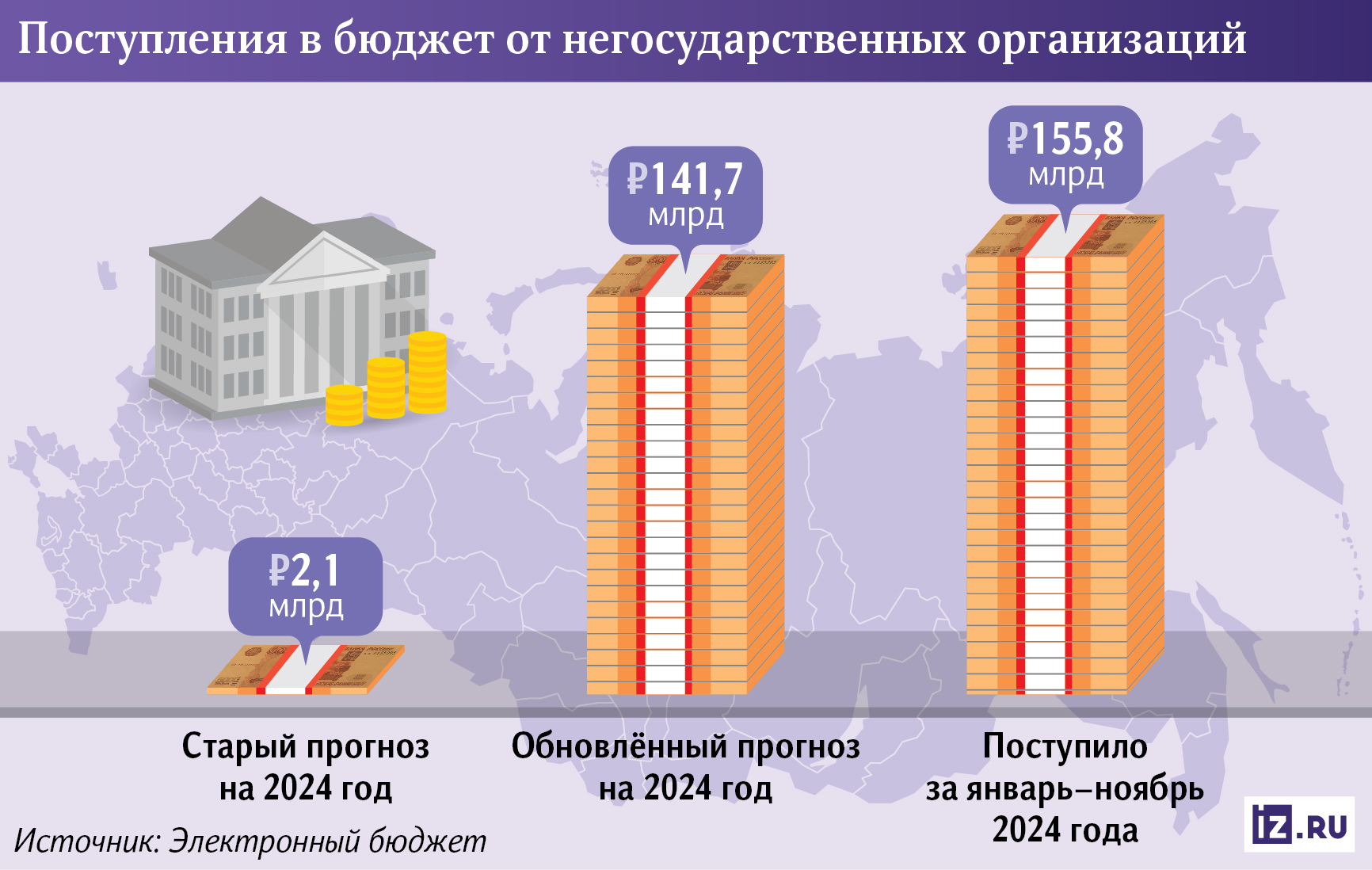The long installment: fees from exiting businesses exceeded the plan 74 times over

Voluntary contributions of companies leaving Russia have exceeded the initial plan for the year 74 times. In 11 months, they transferred 156 billion rubles to the treasury, according to data from the Electronic Budget. And this is already one and a half times more than for the whole of 2023. Receipts are growing, despite the fact that the number of transactions is decreasing. The main reason is the consistent tightening of conditions and the increase of the levy rate to 35%. What companies left the Russian Federation this year, what it means for the economy and how such transactions are reflected in the ruble exchange rate - in the material of "Izvestia".
What revenues the budget received from the leaving companies
At the end of November, the treasury received 155.8 billion rubles in gratuitous payments from non-state organizations, according to the operational data of the Electronic Budget (Izvestia has studied them). At the same time, the initial forecast for the whole of 2024 for this item is 74 times lower - 2.1 billion rubles. This refers to revenues associated with the sale of foreign assets, the explanatory note to the financial plan for 2024-2026 specifies.
Meanwhile, in the budget for the next three-year period, the forecast for such revenues in 2024 has been updated to 141.7 billion, recalled Olga Belenkaya, head of macroeconomic analysis at Finam. So, this revised plan for the year has already been exceeded by almost 10%, and 11 months have passed so far.
If we compare the amount of voluntary contributions of outgoing companies with last year, in 2024 it exceeded the amount for the entire 2023 almost one and a half times. "Izvestia" asked the Ministry of Finance to explain the dynamics of receipts under this item.
In December 2022, the authorities introduced a commission on the sale of Russian business by non-residents from unfriendly countries. Such transactions must be approved by the government commission on foreign investment - and they will not be approved without a voluntary contribution. In addition, according to the rules, outgoing investors in the sale of assets must provide at least 60% discount from the value determined by an independent appraisal.
The requirements for outgoing companies have been consistently tightened. In the fall of 2023, the contribution was raised from 10 to 15% of the asset's market value, and in October 2024 it was raised to 35%. In addition, according to the latest rules, if the value of a transaction exceeds 50 billion rubles, it must be made only with the consent of the president personally.
Which companies will leave the Russian Federation in 2024
In 2024, some of the foreign brands that made the decision to leave and ceased operations back in 2022-2023 have finalized the sale of their Russian assets. These include, for example, food company Danone, printer and computer manufacturer Hewlett-Packard (HP), automaker Hyundai, the largest manufacturer of construction and mining equipment Caterpillar, Ceetrus, the French subsidiary of Auchan, and FMCG manufacturer Unilever.
In addition, the Swedish Ingka Group, which owns IKEA, sold its last assets in Russia only in November. And in December, a deal with the brewing company Carlsberg (which operated under the Baltika brand in Russia) is due to take place.
According to the AK&M agency (authorized by the Central Bank to disclose information on securities), in 2023, 97 deals were made to buy out foreigners from their assets in Russia, recalled Olga Belenkaya. At the same time, in the first half of 2024 (the latest data) there were only 34 such agreements.
While the number of transactions has generally declined, large sales have contributed to the growth of proceeds from contributions, emphasized Natalia Milchakova, a leading analyst at Freedom Finance Global. She specified: for example, the split of Yandex NV, which completed the transfer of Yandex to Russian investors in the summer, while still remaining in the Netherlands, retaining its international assets. The value of the transaction amounted to 475 billion rubles.
Also in March, Kazakh gold mining company Polymetal closed a deal to sell Russian assets to Mangazeya Plus for $3.7 billion, recalled Alexander Zelinko, a member of the Russian Bar Association and an expert in civil law disputes.
Will foreign companies continue to leave Russia?
The actual volume of voluntary contributions turned out to be significantly higher than budget expectations due to low planned values, said Elena Voronkova, associate professor of the Department of State and Municipal Finance at the Plekhanov Russian Economic University. These are rather one-time receipts, and it is difficult to forecast them.
The growth of voluntary contributions to the budget from foreign companies is primarily due to the tightening of exit conditions, believes Natalia Milchakova.
Although fewer foreigners are leaving Russia, the process continues due to the tightening of sanctions, said Elena Voronkova. The expert explained: on the one hand, foreign companies are leaving the Russian market due to fears of secondary restrictions, on the other hand, business wants to minimize losses in connection with the withdrawal of assets from Russia.
- Many foreign companies, despite the political pressure, are in no hurry to leave the Russian Federation, having developed alternative mechanisms of cooperation on export-import supplies. About half of them continue their daily work, 25% have transferred their business into trust management to close or affiliated organizations, and 25% have actually left the Russian solvent market, bearing losses," shared Khadzhimurad Belkharoev, Associate Professor at the Faculty of Economics of PFUR.
Nevertheless, they do not rule out that one day they will return. Coca-Cola, Pepsi, Starbucks, IKEA, Jagermeister and Hugo Boss, hoping for the normalization of relations, are extending the registration of their trademarks in Russia, the expert said.
According to the new budget, for the next three years the authorities again set aside only a symbolic 1 billion rubles from voluntary contributions of the outgoing companies (295 million each year).
How the departure of foreign companies affects the Russian economy
For the Russian budget, such gratuitous receipts do not seem significant, says Olga Belenkaya of Finam. However, under the conditions of continuing increase in expenditures and deficit, any income is important for the Ministry of Finance and capital outflow is undesirable. This can be associated with the tightening of requirements for the exit of foreign companies, the expert explained.
At the same time, the amount of 156 billion is comparable to spending on science, culture or sports, said Natalia Milchakova from Freedom Finance Global.
- The replenishment of the budget at the expense of departing non-residents is of only tactical importance, while import substitution will require triple efforts in strategic terms," Andrei Barkhota, PhD in Economics, added.
At the same time, there are risks of impact of transactions on the exit of non-residents from the Russian business on the ruble exchange rate, added Elena Voronkova from Plekhanov Russian Economic University. Foreigners, having received payment, withdraw it in foreign currency abroad - this puts pressure on the ruble exchange rate.
Vladimir Putin at the forum "Russia Calling!" December 4, said that the Russian Federation did not kick Western companies out of its market and is not against their return. At the same time, he emphasized that it would not be easy for them to come, as domestic brands and companies from friendly countries have already occupied the vacated niches. According to him, about a quarter of foreign organizations have completely left the Russian Federation, while the rest continue to work.

Переведено сервисом «Яндекс Переводчик»








